IOS Lecture on "Orientalism and Empire Building: A Study of British Scholar-Travellers to Arabia (20th Century)"
November 22, 2014 at IOS Conference Hall
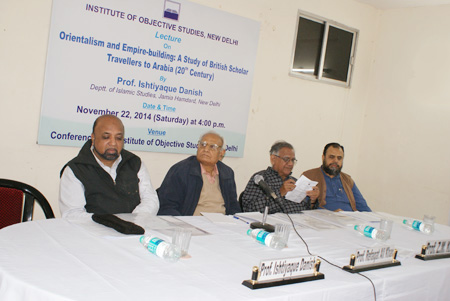
A lecture on "Orientalism and Empire Building: A Study of British Scholar-Travellers to Arabia (20th Century)" was organised at IOS Conference Hall here on November 22, 2014. Delivering the lecture, Prof. Ishtiyaque Danish, Associate Professor of Islamic Studies, Jamia Hamdard, noted that the Orientalists of the 19th century concentrated more on art, literature and culture, and the British travellers who travelled to China and Arabia did the same. In the later years, the study of the Muslim world developed into a specialised field. What contributed to the interest of the Britishers in the study was their thinking that they were superior to the Arabs. He argued that such scholarship was always backed by imperial purposes. This was the reason why Britain and the West did not view the Muslim world from a realistic angle, but treated it as a problem, he pointed out.
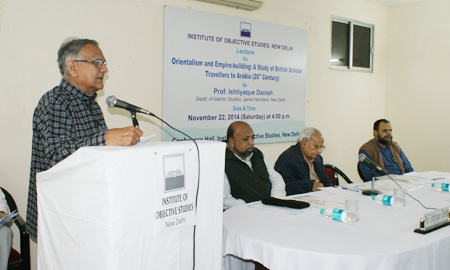
Prof. Danish held that prior to Edward Said's pioneering work, Orientalism, the common understanding of the term was to study the art, literature and culture of the East, particularly the Muslim world. But after the publication of Said's celebrated work in 1978, it came to the knowledge of scholars that such works had generally implied a patronising Western attitude towards the Muslim societies, their religion, culture and civilisation that flourished in the Middle East and North Africa. Said proved that the West believed the East, particularly the Islamic world, was static and underdeveloped which could be studied and analysed. He maintained that Said even charged that the West created, even fabricated, the Orient as static, traditional and mired in history, which implicitly meant that the West was flexible, developed, rational and consequently superior.
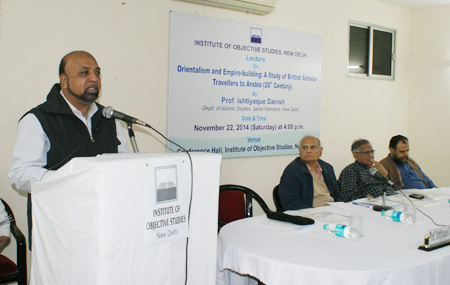
Focusing on three scholar-travellers of the 20th century - Gertrude Bell, St. John Philby and Lawrence of Arabia (TE Lawrence) - he said that they played a role in shaping the modern West Asian nation-states. He observed that Bell and Lawrence went to Arabia before World War I and Philby was sent to the region from India towards the end of the war. Bell and Lawrence were agents of the British Empire, though apparently they championed the Arab cause. Philby, an Indian Civil Service Officer, believed in the virtue of the British Empire and wanted to embark on a "civilising" mission, he added.
Prof. Danish opined that Philby clashed with his own government, often bitterly criticising it for its failures. Later on he embraced Islam. He said that it was mainly Lawrence of Arabia who damaged the Arabs the most, though for years he was celebrated as an Arab champion. He planned to divide Islam against itself and almost succeeded in it. Prof. Danish pleaded for the study of Lawrence's legacy from a Muslim perspective as it might help in addressing the issues facing West Asia today.
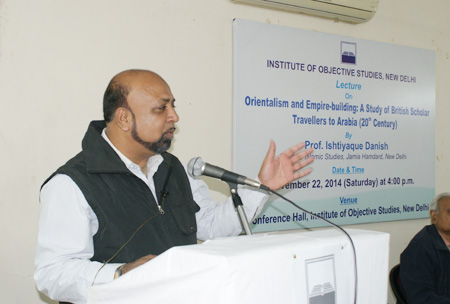
Prof. Danish explained that Britain provided Oriental scholarship in order to elicit information about the Muslim world. Britishers believed that only sending troops there was not going to serve the purpose.
Issues like different tribes, their loyalty to tribal headmen, leaders who could be contacted and their support sought, dominated the decision of the British government to send its Generals to the Arab world as travellers for collecting information which formed the basis for devising an imperial strategy. In this connection, he referred to Philby, who belonged to a respectable British family. He remarked that it was Winston Churchill who changed the course of history of the Middle East after acting on the advice of Lawrence, adding that even today only those ruling families were ruling several Arab states as were liked by Britain. He said that Lawrence desired that Islam be divided in order to save Britain from any potential threat. This policy was pursued by dividing Islam into Turkish and Arabian Islam, so that both of them continued to fight, leaving no scope for danger to the British government.
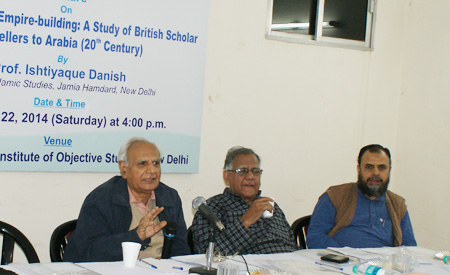
He said that Lawrence was a member of the Round Table Conference. He maintained that though the sun never set on the British Empire for a long while, Arabia was not part of it. Since it was impossible to include Turkey in the colonial rule of Britain, attempts were made to include Arabs as members of the Round Table Conference. Besides being a young soldier, Lawrence was a traveller who worked as a spy in Arab countries for Britain. Winston Churchill gave him an opportunity to present his views before the Round Table Conference, so that the map of the Middle East could be changed, he concluded.
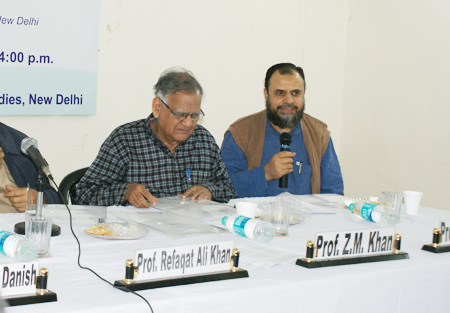
Earlier, introducing the topic of the lecture, the Secretary-General of the IOS, Prof. Z.M. Khan, commented that the issue was concerned with the history and image of Muslims. He regretted that today Islamophobia was the global sentiment and every evil was attributed to Muslims. Muslims contributed positively to the development of civilisation and Islam's influence was reflected everywhere, from philosophy to calligraphy. This was continuing even today.
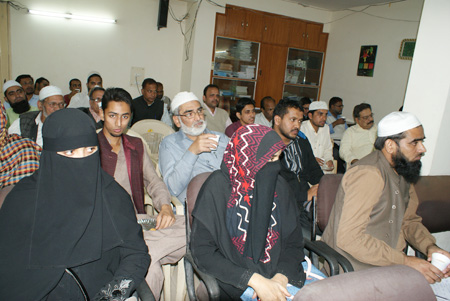
A verse from the holy Quran was recited by Maulana Abdullah Tariq to mark the beginning of the lecture. Dr. Nakhat Hussain Nadvi conducted the proceedings. Those who were present at the lecture included: Vice-Chairman of the IOS, Prof. Refaqat Ali Khan, Professor of Law, Gurugobind Singh Indraprastha University, Prof. Afzal Wani, Dr. Aftab Alam, Mohd. Shafi, K.P. Salim Ahmad, Safi Akhtar, Bismil Arifi, Wasim Ahmad, Ms. Nilofar Khan, Anis Mansoori, Pervez Ashrafi and Sayed Ashraf.
Go Back